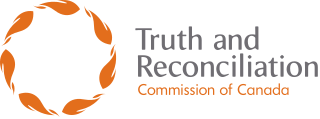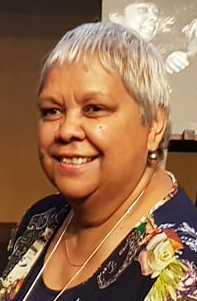
Reconciliation education is a teaching-learning framework for improving participants' attitudes toward other groups of people, developed in Australia by Adam Heaton.

Reconciliation education is a teaching-learning framework for improving participants' attitudes toward other groups of people, developed in Australia by Adam Heaton.
The term reconciliation relates to race relations in this context, as used in various countries around the world, including Australia. [1] [2] [3] [4] [5] [6]
Reconciliation education was developed by Adam Paul Heaton based on findings from his 2014 PhD study. [7] [8] [9] The study found that as Australian Grade 8 students engaged in a positive discourse about Aboriginal Australians, they developed more positive attitudes toward the other group. [10]
The educational framework is aimed at improving attitudes and relationships among different groups of people. [7] [11] The other group may possess characteristics diverse from participants' own, such as a different ethnicity, religion or political affiliation. [12] Participants engage in awareness-raising, truth-telling, perspective-taking, imagination and empathy as they consider a positive discourse designed to counter negative and prejudiced attitudes toward the group (see Figure 1). [13] [14]
Points of commonality exist with allophilia [12] and reconciliation. [15] [16]

Adam Roy Goodes is a former professional Australian rules footballer who played for the Sydney Swans in the Australian Football League (AFL). Goodes holds an elite place in VFL/AFL history as a dual Brownlow Medallist, dual premiership player, four-time All-Australian, member of the Indigenous Team of the Century and representative of Australia in the International Rules Series. In addition, he has held the record for the most VFL/AFL games played by an Indigenous player, surpassing Andrew McLeod's record of 340 during the 2014 AFL season before having his own record surpassed by Shaun Burgoyne during the 2019 AFL season.
White guilt refers to a belief that white people bear a collective responsibility for the harm which has resulted from historical or current racist treatment of people belonging to other racial groups, as for example in the context of the Atlantic slave trade, European colonialism, and the genocide of indigenous peoples.

Stan Grant is an Australian journalist and writer, having worked as a television news and political journalist and presenter since the 1990s. As of July 2020, Grant is also a Senior Fellow at the Australian Department of Defence, multiple government and Defence Industry funded Australian Strategic Policy Institute. As of 2021, he is the Charles Sturt University vice-chancellor's chair of Australian/Indigenous Belonging. He is known for his writing on Indigenous issues and has written and spoken extensively on his Aboriginal identity as a Wiradjuri man.
Reconciliation Australia is a non-government, not-for-profit foundation established in January 2001 to promote a continuing national focus for reconciliation between Indigenous and non-Indigenous Australians. It was established by the Council for Aboriginal Reconciliation, which was established to create a framework for furthering a government policy of reconciliation in Australia.

The Freedom Ride of 1965 was a significant event in the history of civil rights for Indigenous Australians.
Allophilia is having a positive attitude towards outgroup members. The outgroup members can be anyone who possesses characteristics that are different from one's own, such as people of different races, religions, cultures, etc. It is a framework for understanding effective intergroup leadership and is conceptualized as a measurable state of mind with tangible consequences.
Chris Sarra is an Australian educationalist, and the founder and Chairman of the Stronger Smarter Institute. Sarra grew up in Bundaberg, Queensland as the youngest of ten children to parents of Italian and Aboriginal heritage, and he experienced first-hand many of the issues faced by Indigenous students throughout their schooling.

The Truth and Reconciliation Commission of Canada was a truth and reconciliation commission active in Canada from 2008 to 2015, organized by the parties of the Indian Residential Schools Settlement Agreement.
Raymattja Marika, also known as Gunutjpitt Gunuwanga, was a Yolngu leader, scholar, educator, translator, linguist and cultural advocate for Aboriginal Australians. She was a Director of Reconciliation Australia and a member of the Australian Institute of Aboriginal and Torres Strait Islander Studies. She was also a director of the Yothu Yindi Foundation and a participant in the 2020 Summit, which was held in April 2008. Marika advocated understanding and reconciliation between Indigenous Australian and Western cultures.
Symbolic racism is a coherent belief system that reflects an underlying one-dimensional prejudice towards any ethnicity. These beliefs include the stereotype that black people are morally inferior to white people, that white people are racist, and that black people violate traditional White American values such as hard work and independence. However, symbolic racism is more of a general term than it is one specifically related to prejudice towards black people. These beliefs may cause the subject to discriminate against black people and to justify this discrimination. Some people do not view symbolic racism as prejudice since it is not linked directly to race but is indirectly linked through social and political issues.

Jacqueline Gail "Jackie" Huggins is an Aboriginal Australian author, historian, academic and advocate for the rights of Indigenous Australians. She is a Bidjara/Pitjara, Birri Gubba and Juru woman from Queensland.
Racism in Australia traces both historical and contemporary racist community attitudes, as well as political non-compliance and governmental negligence on United Nations human rights standard and incidents in Australia. Contemporary Australia is the product of Indigenous peoples of Australia combined with multiple waves of immigration, predominantly from the United Kingdom and Ireland.

Indigenous education specifically focuses on teaching Indigenous knowledge, models, methods, and content within formal or non-formal educational systems. The growing recognition and use of Indigenous education methods can be a response to the erosion and loss of Indigenous knowledge through the processes of colonialism, globalization, and modernity.
The Closing the Gap framework is an Australian government strategy that aims to reduce disadvantage among Aboriginal and Torres Strait Islander people, based on seven targets. From adoption in 2008, after meetings with the Close the Gap social justice campaign, until 2018, the federal and state and territory governments worked together via the Council of Australian Governments (COAG) on the framework, with the Department of the Prime Minister and Cabinet producing a report at the end of each year analysing progress on each of its seven targets.
The Catholic Church opposes racism and discrimination on the basis of race, but some Catholics have historically promoted 'racist practices' as recently as the twentieth century and has thus been critiqued for inadequacy in constructively attempting to work on fixing racial tensions. This can be viewed through the examination of different races including the Jewish population, the African-American population and the Indigenous population. However, the Catholic Church's acknowledgement of its "moral shortcomings" and its "complicity" in relation to this issue has led to an enhanced and progressive effort to resolve the situation, heightened by the induction of Pope John XXIII in 1958. Included then are both the current attitude of the Catholic Church in relation to racism and discrimination, as well as the responses of the Church, which are highlighted through the different objectives of various Catholic groups, which were developed in an attempt to combat racist ideology and promote a more inclusive culture.
Indigenous treaties in Australia describe legal documents defining the relationship between Indigenous Australians and the Government of Australia or the government of an Australian state or territory. As of 2021 there are no such treaties in existence.
Australians for Native Title and Reconciliation (ANTaR) is an independent, national non-government, not-for-profit, community-based organisation founded in 1997 which advocates for the rights of Aboriginal and Torres Strait Islander people in Australia and aims to help overcome disadvantage. Its staff, board and membership comprise mainly non-Indigenous people who support Indigenous voices and interests.
Reconciliation in Australia is a process which officially began in 1991, focused on the improvement of race relations between the Aboriginal and Torres Strait Islander peoples of Australia and the rest of the population. The Council for Aboriginal Reconciliation (CAR), created by the government for a term of ten years, laid the foundations for the process, and created the peak body for implementation of reconciliation as a government policy, Reconciliation Australia, in 2001.
Constitutional recognition of Indigenous Australians has been campaigned for since 1910, including having an Indigenous voice to parliament enshrined in the Constitution.

Rebecca Sockbeson is a Wabanaki scholar and activist in the field of Indigenous Peoples' education.